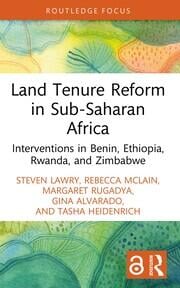This book examines the impacts of land tenure reform interventions imple-mented in Benin, Ethiopia, Rwanda, and Zimbabwe.Since 2000, many African countries have introduced programs aimed at providing smallholder farmers with low-cost certificates for land held un-der customary tenure. Yet there…
There is a noticeable dearth of empirical studies on the mediating role of travel behaviour on the influence of residential density on traffic congestion in developing countries particularly in Zimbabwe To address this gap this study examined the effect of residential density on traffic…
Context and background There is a reciprocal relationship between theory, policy and practice. Property valuation as practiced today is elucidated by certain standards and policies which are based on theoretical foundations. The axioms of value have been postulated throughout history, from pre-…




